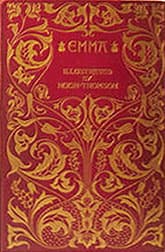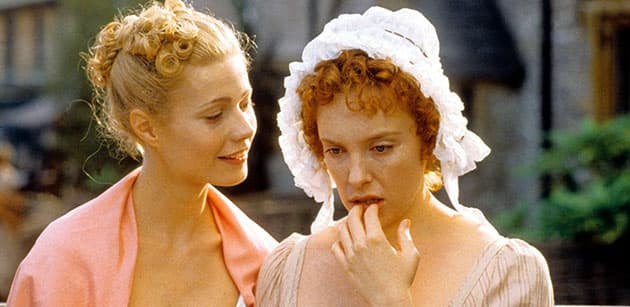Emma
Critique • Quotes • At the movies
 1897 edition
1897 editionFirst publication
1815
Literature form
Novel
Genres
Literary, romance
Writing language
English
Author's country
England
Length
Approx. 155,000 words

Gwyneth Paltrow as Emma gives bad advice to Toni Collette as Harriet Smith in the 1996 film.
Enjoyable, empty-headed stroll through Austen
Emma (1996): Film, 120 minutes; director Douglas McGrath; writer McGrath; featuring Gwyneth Paltrow, Toni Collette, Jeremy Northam, Alan Cumming, Ewan McGregor, Greta Scacchi, Polly Walker
Something is missing in the 1996 theatrical film adaptation of Jane Austen's Emma.
Perhaps it's something in the characterization of the titular Emma Woodhouse, or in the lack of consequences to her smug judgments of others. Her misguided match-making and snobbish advice nearly destroys her friend, Harriet Smith, not once but twice, and yet everything works out for both of them—too easily. Her meddling in others' romances and her condescending class consciousness leads finally to an upbraiding by her friend George Knightly, but he continues to love her. However pig-headed she gets, it seems we're supposed to all be a little in love with Emma. She has a few moments of self-doubt and issues a few apologies here and there, but she never really changes and continues to float through her comfortable home and social life.
I'm guessing it's because she's Gwyneth Paltrow, an American actress with that star quality of being relentlessly charming on screen, however poorly the character behaves.
Paltrow is also an actress who is, at least in Emma, what Malcolm Gladwell would call "matched". That is to say, you can always tell what's going on in the character's mind because it's reflected on Paltrow's face—be it pride, petulance, scheming, self-doubt or annoyance—there's little mystery about what's going on inside this Emma.
So why haven't all her friends and would-be lovers figured her out. Can't Mr. Elton see by her expressions she's not interested in him? Can't Harriet see how she's being manipulated? Mr. Knightley does read her, but why isn't he turned off?
Miss Woodhouse gets her comeuppance from Mr. Knightly in the 1996 film of Emma.
Much of this is in the source material from Austen. She purposely created a character she thought everyone except her would dislike. And most of the novel is presented from Emma's perspective, which naturally creates sympathy for the character, however mistaken she may be.
But Austen's novel can afford to spin out Emma's inner excitement, as well as her qualms, at greater length with more nuances. In the condensed feature film, it all becomes too obvious. Too often during the continual misunderstandings we want to exclaim to the characters—both Emma and her companions—"Don't be so stupid! Can't you hear what he/she is saying? Can't you see what's happening?"
Deeper interaction
None of this, however, will spoil the film Emma for die-hard Jane Austen fans. And there are many good features of this production for the rest of us. The acting is uniformly good in that British theatrical fashion, despite the actors being from around the world.
Brit thespian Jeremy Northam is solid as Mr. Knightley, one of the few characters who becomes more central to the movie than he was in the novel, with deeper interaction with Emma than in the book. Both his chastisement of Emma and his profession of love to her are among the most moving scenes in the film.
Australian actor Toni Collette is almost unrecognizable as the other co-star, the thin actress having plumped up for the role as Emma's misled and hapless friend. Scottish-American actor Alan Cumming is appropriately weaselly as the avaricious cleric, Mr. Elton.
Scotland's Ewan McGregor is also hard to spot, sporting long hair and dandyish clothes as the dashing Frank Churchill, whose subplot of his secret engagement to Jane Fairfax (Polly Walker) is given short shrift in this adaptation.
They're all—including Paltrow—very good, as is the production overall, with a leisurely pace and long, tasteful shots in that British masterpiece style. An enjoyable stroll through an Austen classic.
But there's nothing really at stake here. This film brings out those aspects of Austen's work that her detractors focus on: a bunch of empty-headed, well-to-do country gentry absorbed in their efforts to make suitable marriages with each other, with a few lessons on behaviour in polite company thrown in.
There is actually more depth to Austen than this, but you wouldn't get it from this production. Thank goodness for the character of Mr. Knightley presenting at least a nod to greater issues at play in the otherwise self-centred shenanigans of these privileged folks.
— Eric

